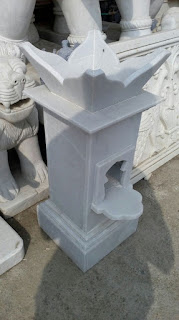Tulsi Kyari : Importance
Tulsi or Tulasi (Ocimum tenuiflorum) or Holy Basil is a sacred plant in Hindu belief. Hindus regard it as an earthly manifestation of the goddess Tulsi , she is regarded as a great worshipper of the god Vishnu. The offering of its leaves is mandatory in ritualistic worship of Vishnu and his forms like Krishna and Vithoba.
Many Hindus have tulsi plants growing in front of or near their home, often in special pots or a special masonry structure known as Tulsi Vrindavan as this is related to their culture. Traditionally, Tulsi is planted in the center of the central courtyard of Hindu houses. The plant is cultivated for religious and medicinal purposes, and for its essential oil. It has many health benefits as well.
While tree worship is not uncommon in Hinduism, the Tulsi plant is regarded as the holiest of all plants.The Tulsi plant is regarded as a threshold point between heaven and earth. A traditional prayer tells that the creator-god Brahma resides in its branches, all Hindu pilgrimage centres reside in its roots, the Ganges flows through its roots, all deities in its stem and its leaves and the Hindu scriptures - the Vedas in the upper part of its branches.It is considered as household god particularly referred as a "Women's deity". It is called as "the central sectarian symbol of Hinduism" and Vaishavas consider it as "the manifestation of god in the vegetable kingdom”.
The Tulsi plant is grown in or near almost every Hindu house, especially by Brahmins and Vaishnavas. A house with a Tulsi plant is sometimes considered a place of pilgrimage. Sacred places where they are grown are also known as Vrindavan (grove of Tulsi). Vrindavan is a raised cuboid stone or brick structure often in middle of the house's courtyard or in front of the house.
A person who waters and cares for the Tulsi daily is believed to gain moksha (salvation) and the divine grace of Vishnu, even if he does not worship it. Traditionally, the daily worship and care of the plant is the responsibility of the women of the household. The plant is regarded as a "women's deity" and a "symbol of ideal wifehood and motherhood".
We are offering a superior quality designer marble tulsi kyara / marble vrindavan to our most valued clients. These marble tulsi kyara / marble vrindavan are made by using superior quality raw material which ensure its quality and durability. These designer marble tulsi kyara / marble vrindavan are available in various types and we offer at wholesale rates.
Many Hindus have tulsi plants growing in front of or near their home, often in special pots or a special masonry structure known as Tulsi Vrindavan as this is related to their culture. Traditionally, Tulsi is planted in the center of the central courtyard of Hindu houses. The plant is cultivated for religious and medicinal purposes, and for its essential oil. It has many health benefits as well.
 |
| White Marble Tulsi Pot: 2ft |
 |
| Minkari Work Tulsi Pot 3ft |
While tree worship is not uncommon in Hinduism, the Tulsi plant is regarded as the holiest of all plants.The Tulsi plant is regarded as a threshold point between heaven and earth. A traditional prayer tells that the creator-god Brahma resides in its branches, all Hindu pilgrimage centres reside in its roots, the Ganges flows through its roots, all deities in its stem and its leaves and the Hindu scriptures - the Vedas in the upper part of its branches.It is considered as household god particularly referred as a "Women's deity". It is called as "the central sectarian symbol of Hinduism" and Vaishavas consider it as "the manifestation of god in the vegetable kingdom”.
The Tulsi plant is grown in or near almost every Hindu house, especially by Brahmins and Vaishnavas. A house with a Tulsi plant is sometimes considered a place of pilgrimage. Sacred places where they are grown are also known as Vrindavan (grove of Tulsi). Vrindavan is a raised cuboid stone or brick structure often in middle of the house's courtyard or in front of the house.
A person who waters and cares for the Tulsi daily is believed to gain moksha (salvation) and the divine grace of Vishnu, even if he does not worship it. Traditionally, the daily worship and care of the plant is the responsibility of the women of the household. The plant is regarded as a "women's deity" and a "symbol of ideal wifehood and motherhood".
We are offering a superior quality designer marble tulsi kyara / marble vrindavan to our most valued clients. These marble tulsi kyara / marble vrindavan are made by using superior quality raw material which ensure its quality and durability. These designer marble tulsi kyara / marble vrindavan are available in various types and we offer at wholesale rates.




How to buy this?
ReplyDeletePlease contact on 9799268422
Delete